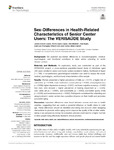Sex-differences in health-related characteristics of senior center users: the VERISAÚDE study

Use este enlace para citar
http://hdl.handle.net/2183/25688
A non ser que se indique outra cousa, a licenza do ítem descríbese como Creative Commons Attribution 4.0 International License (CC-BY 4.0)
Coleccións
- Investigación (FCS) [1293]
Metadatos
Mostrar o rexistro completo do ítemTítulo
Sex-differences in health-related characteristics of senior center users: the VERISAÚDE studyAutor(es)
Data
2020-05-15Cita bibliográfica
Lorenzo-López L, López-López R, Maseda A, Buján A, Rodríguez-Villamil JL, Millán-Calenti JC. Sex-differences in health-related characteristics of senior center users: the VERISAÚDE study. Front Psychol. 2020 May 15;11:964.
Resumo
[Abstract]
Background: We explored sex-related differences in sociodemographic, medical,
psychological, and functional conditions in older adults attending to senior
citizens’ centers.
Materials and Methods: An exploratory study was conducted as part of the
VERISAÚDE project, a cross-sectional population-based study of individuals aged
≥65 years enrolled in senior community centers located in Galicia, Northwest of Spain
(n = 749). A comprehensive gerontological evaluation was used to assess the social,
medical, psychological, and functional characteristics of the sample.
Results: Women presented a higher prevalence of frailty (p = 0.017), a higher risk of
malnutrition (p = 0.029), more medication consumption (p = 0.002), and polypharmacy
(p = 0.008), higher depressive scores (p = 0.007), and lower cognitive scores (p = 0.045)
than men, who showed a higher prevalence of hearing impairment (p = 0.034),
toxic habits (all ps = 0.0001), and comorbidity (p = 0.002), and better quality of life
(p = 0.030), and social resources (p = 0.002). Participants considered that attending and
being involved in senior centers has a positive influence on their health and promotes
successful aging.
Discussion: Important differences were found between women and men in health
variables, suggesting that sex exerts a powerful influence on health status in older
age. These differences should be identified and taking into account when designing
interventions to promote active aging and to improve the quality of life of older adults.
Taking a sex perspective during the evaluation process could lead to a higher number
of older people being effectively treated in clinical practice.
Palabras chave
Older adults
Health
Sex-related differences
Women characteristics
Multidimensional assessment
Health
Sex-related differences
Women characteristics
Multidimensional assessment
Versión do editor
Dereitos
Creative Commons Attribution 4.0 International License (CC-BY 4.0)
ISSN
1664-1078






